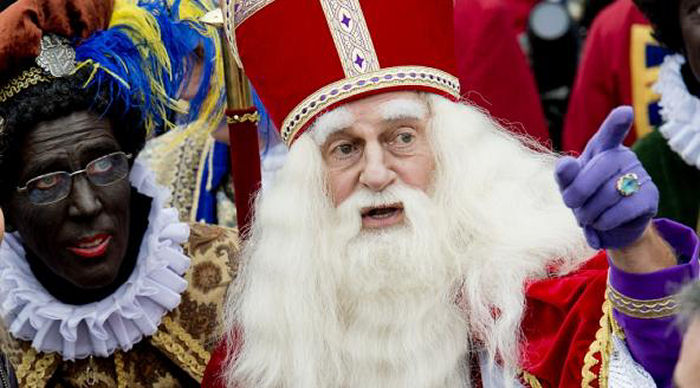So, as the fifth of December approaches the conversation of the ethics behind the traditional celebration of St. Nicholas’ birthday in the Netherlands is flaring up again, too. The controvesy surrounds St. Nicholas’ helper, zwarte Piet, or black Pete.
According to the story told to children in the Netherlands, St. Nicholas was a holy man from Spain, who would travel with his boat to the Netherlands and run across the rooftops astride his white horse, sending black Pete down the chimneys to leave presents for the good children and kidnap the children who had been bad and take them back to Spain. Of course, the origin of black Pete is never really discussed, and children hardly ever question why he’s black or foppishly dressed.
Oh, and St. Nicholas doesn’t have one black helper, he has several, all affectionately called zwarte Piet, kind of in the same way that the Smurfs don’t have any real names, I guess.
Historically, St. Nicholas was the bishop of Mira, was Turkish, and had bought the freedom of an Etheopian slave boy somewhere around the Mediterranean who decided to stay with St. Nicholas voluntarily.
There’s an ever growing group of people in the Netherlands who think that the tradition is offensive and racist and that it has no place in modern society. In the last ten or fifteen years or so, it hasn’t grown more racist, but the voices opposing the celebration have gotten louder and due to the growing climate of political correctness, it’s long past its time to be addressed properly.
Being white and having grown up with the tradition, I sympathise with those people who defend it; their main argument is that while the tradition may have had its roots in slavery and oppression, it’s current incarnation has nothing to do with racism and to most the thought has never entered their minds. It’s something you’re raised with and having celebrated St. Nicholas hasn’t made people more racist or less loving towards people with a different skin colour.
The fact that most apologists and defenders of the tradition truly believe this makes them kneejerk at the accussation of racism laid at their feet. They immediately defend themselves against what they perceive to be an unfair characterisation of their intentions and their nature. Unfortunately, that doesn’t really cut to the heart of it.
Whether people like it or not, whether it’s fair or not, or whether it’s racist or not, the fact remains that the tradition has upset and is continuing to upset more and more people. The growing sensitivity toward racism by people of all colours, including white, is something that can’t be ignored.
I think the tradition is indefensible. There are two questions people need to answer:
- Am I a racist?
- Do I care about other people’s feelings?
If the answer to your first question is yes, then cool, you’re a racist, you admit that the traditional celebration is racist and the opposers are right in their objection. If the answer to the first question is no, then you have to ask yourself the second question.
If the answer to the second question is yes, you admit that the tradition hurts other people and if you’re not weird, you’ll stop. If the answer to the second question is no, then you’re being deliberately unpleasant.
From this it follows that if you refuse to give up this tradition, you’re either a racist or you’re a douchebag.
The Netherlands isn’t the only people to have this tradition, but I think it might be one of the few places where the population is so predominantly white, so overwhelmingly stubborn to admit that it is either racist (intentional or otherwise) or deeply insensitive.
Like Sam Harris said, with most debates, especially on hot button issues, it’s almost impossible to convince someone in real time. If you’re going to change their minds, it will always be after the debate, when everyone has had time to reflect upon the arguments. This is only compounded by the fact that the overwhelming majority of the apologists truly don’t believe that it’s a racist tradition and feel attacked when even the suggestion of impropriety is made.
On the other hand, those who oppose the tradition are generally culturally insensitive as well, especially foreigners who weren’t brought up with the tradition and can’t quite believe that anyone can deny the racism behind it.
I believe that one way or the other, it’s a dying tradition. American cultural imperialism is pushing us towards Christmas and Santa Claus, and unless we give up the racist element of the traditional St. Nicholas celebration and somehow manage to harmonise it with Santa Claus, it’s going to die out long before the debate is settled. Until that time, either you’re a racist, or you’re a douche. :)
[Edit]
An interview with Quinsy Gario, the most prominent anti-zwarte Piet activist:
http://www.youtube.com/watch?v=o8TX6RSv3GQ
An interview with Prem Radhakishun, a columnist, journalist, etc. and another anti-zwarte Piet activist:
http://www.youtube.com/watch?v=jJyY8UlZKaU
Especially, the latter has a good point regarding that a large Dutch, white majority have tried to determine whether or not a minority are allowed to complain and object against the tradition.
NRC: Kan Zwarte Piet nog wel? Vier vragen rond de groeiende controverse

